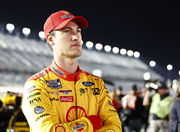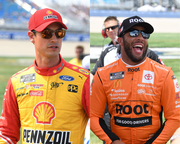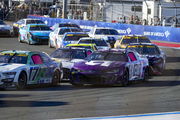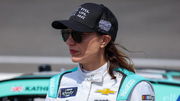
via Imago
Kyle Petty and Richard Petty | Image Credits – Imago

via Imago
Kyle Petty and Richard Petty | Image Credits – Imago
Any sport has a hierarchy of best, average, and low-performing entities. Hard work, talent, and strategy hugely determine who occupies which rank. Yet NASCAR is on a quest to absolve this hierarchy. Introducing parity among race cars is their modern-day policy, and any driver trying to up their game would face legal action.
After the Next Gen car followed NASCAR’s parity norm in Martinsville, racers and fans were equally frustrated. Denny Hamlin complained about passing difficulties, while fans did not enjoy it at all. Now hear about it from one of the NASCAR royalty: Richard Petty.
ADVERTISEMENT
Article continues below this ad
Richard Petty recalls a golden age of racing
Modern-day racing is a thousand miles away from racing in the 1970s. Some factors included a larger number of competitors and races. The style of racing was also vastly different, and drivers were prone to all kinds of risk. Today, SAFER barriers, head and neck restraints, and other safety checks exist.
A major point of difference was the role of the driver. A racing team could tweak their cars with a lot of freedom in a bid for glory. Back in the day, fans could choose sides between Richard Petty and Bobby Allison. Races were dotted with rivalries and periods of one-driver dominance. But NASCAR’s parity obsession has stifled such stories.
As he recollected stories of his best Arrow car, Richard Petty observed a lost time when a driver’s car mattered. Dale Earnhardt Jr asked him about his ride, and ‘The King’ responded with pride, laying down the golden standard that worked in those times.
“Probably, early mid-70s, driving a bunch of races with this car, and had a lot of experience with it. Got to run it like 4-5 years, hear me? Of all the race cars I’ve ever had, it was the most natural race car. That was before all the wind tunnel testing and all these kinds of stuff…It was just a pleasure to drive it. It worked on short tracks, road courses, superspeedways, good all around. Best race car I’ve ever had.”
His son, Kyle Petty, quipped along similar lines, saying how the driver’s work was important. “Before that, from a driver’s standpoint, you know, from a Richard Petty, from your dad, from Darrell and guys like that, you felt like everything you learned on a short track, you could take straight to Charlotte and Daytona and everything. It was all about springs, all about shocks, all about hooking up, it was mechanical…For me, I think that was a period when I think the driver could make a difference and a big difference.”
When it comes to modern-day racing, Kyle Petty harbored some strong views regarding parity on the race track.
ADVERTISEMENT
Article continues below this ad
Trending
Petty called NASCAR’s rules ‘dumb’
The parity problem has been bugging drivers way before the Next Gen car rolled in. In NASCAR’s 2000 season, the ten Winston Cup races were won by ten different drivers, which set a modern-day record then. The 1973 Winston Cup champion Benny Parsons had waxed sentimental. He pointed out that by spreading out the awards, the motorsport lacked a superstar to look up to.
Kyle Petty emphasized the same in 2017, albeit with a rough edge. He pointed out the best teams’ hard work is going to waste. “We’re dumbing the sport down. We’re taking Hendrick Motorsports, Joe Gibbs Racing, Richard Childress Racing, Stewart-Haas Racing have worked their rear ends off to develop (air) guns and things and to be better, now we’re saying, ‘That team over there, they can’t do that, so guess what, you don’t get to use it this week.’”
ADVERTISEMENT
Article continues below this ad
NASCAR will need to pay heed to the veterans if it wants to be in the good books of its own racers and fans.
ADVERTISEMENT
ADVERTISEMENT
ADVERTISEMENT
ADVERTISEMENT






